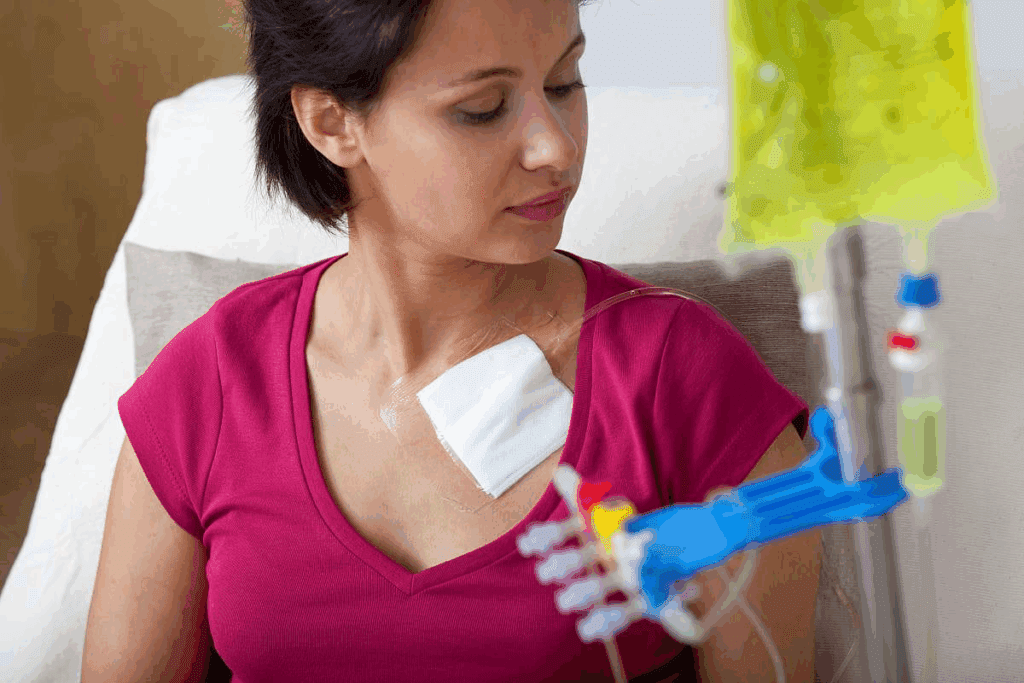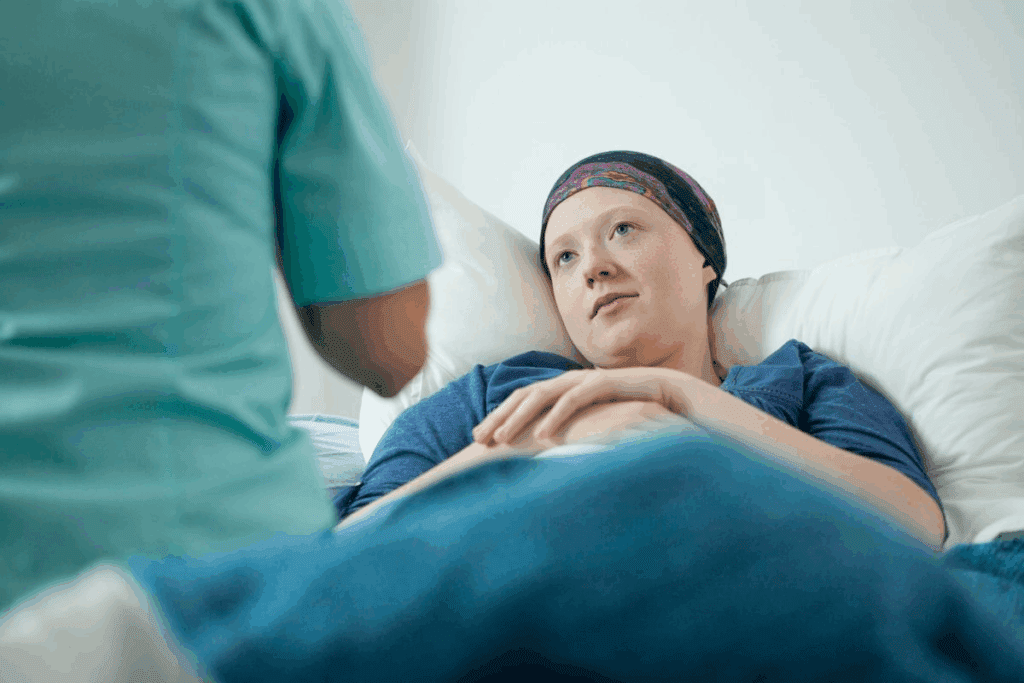Last Updated on November 26, 2025 by Bilal Hasdemir

Chemotherapy for colon cancer is a key treatment that uses strong medicines to kill fast-growing cancer cells throughout the body.
These medicines can be given through an IV or taken as pills. They work to destroy cancer cells while aiming to protect healthy tissues as much as possible.
At Liv Hospital, patient care always comes first. Our experts use the latest innovations in chemotherapy for colon cancer to deliver effective, compassionate treatment — helping patients achieve the best possible outcomes.

Chemotherapy is key in treating colon cancer. It targets cancer cells directly. This treatment uses drugs to kill or slow down cancer cells.
Chemotherapy attacks cells that grow fast, like cancer cells. The drugs used in colon cancer treatment stop these cells from dividing. Oral chemotherapy drugs, like capecitabine, are taken at home for convenience.
Capecitabine turns into its active form in the body. It’s used for colorectal cancer, including colon cancer. It’s chosen for its easy use.
Chemotherapy is suggested for stages 2 and 3 colon cancer. It’s used after surgery to kill leftover cancer cells. The choice to use chemotherapy depends on the cancer stage, patient health, and tumor details.
| Stage of Colon Cancer | Role of Chemotherapy |
| Stage 2 | Chemotherapy may be used to reduce the risk of recurrence, even with high-risk features. |
| Stage 3 | Chemotherapy is often used after surgery to kill any remaining cancer cells. |
Knowing when and how chemotherapy is used is important for colon cancer patients. It effectively targets cancer cells, playing a big part in treating and managing the disease.

It’s key to know how chemotherapy is given to colon cancer patients. The way it’s given can change how well it works and how the patient feels.
There are different ways to give chemotherapy for colon cancer. Each method has its own good points and things to think about. The choice depends on the cancer’s stage, the patient’s health, and the drugs used.
Intravenous (IV) chemotherapy puts drugs straight into a vein. This method lets doctors use many different drugs. It’s common for treating colon cancer. IV chemotherapy can happen in a hospital or clinic, and how often it’s given depends on the plan.
Benefits of IV Chemotherapy:
Oral chemotherapy means taking drugs in pill or capsule form. It’s getting more popular for colon cancer treatment because it’s easy and can cut down on hospital visits. Drugs like capecitabine are taken at home, helping patients keep up with their daily life.
Oral chemotherapy drugs for colon cancer have many benefits, including:
Oral chemotherapy is often used with other treatments like surgery or radiation. The choice between oral and IV chemotherapy depends on the patient’s needs and their cancer’s specifics.
Several key drugs are used in colon cancer treatment. These medications target cancer cells to improve patient outcomes. The choice of drugs depends on the cancer stage and the patient’s health.
5-Fluorouracil (5-FU) is a key drug in colon cancer treatment. It stops cancer cells from growing by interfering with DNA synthesis. Capecitabine, an oral form of 5-FU, offers the same benefits but is easier to take.
Studies show these drugs can increase survival rates in colon cancer patients. They are often combined with other drugs to work better together.
Oxaliplatin and Irinotecan are also important in colon cancer treatment. Oxaliplatin damages cancer cell DNA. Irinotecan stops an enzyme needed for DNA replication.
These drugs are often paired with 5-FU or Capecitabine. This combination has been shown to improve treatment outcomes for colon cancer patients.
New research aims to find better chemotherapy regimens for colon cancer. New drugs target cancer cells more precisely, reducing harm to healthy tissues.
| Drug | Mechanism of Action | Common Use |
| 5-Fluorouracil (5-FU) | Interferes with DNA synthesis | Colon cancer treatment |
| Capecitabine | Oral prodrug of 5-FU | Colon cancer treatment |
| Oxaliplatin | Damages DNA of cancer cells | Colon cancer treatment, often in combination |
| Irinotecan | Inhibits topoisomerase I | Colon cancer treatment, often in combination |
New chemotherapy drugs and combinations are being developed. This offers hope for better outcomes in colon cancer patients.
Understanding chemotherapy regimens is key to treating colon cancer. These protocols aim to be effective while reducing side effects.
Combination therapies are a mainstay in colon cancer treatment. They mix drugs like 5-Fluorouracil (5-FU) and Oxaliplatin to better target cancer cells.
Common regimens include:
| Regimen | Drugs Used | Typical Use |
| FOLFOX | 5-FU, leucovorin, oxaliplatin | Stage III colon cancer |
| FOLFIRI | 5-FU, leucovorin, irinotecan | Metastatic colon cancer |
| CAPOX | Capecitabine, oxaliplatin | Stage III colon cancer |
Choosing between single-agent and combination therapy depends on several factors. These include cancer stage, patient health, and past treatments. Single-agent therapy is for those who can’t handle combination therapy due to health issues.
Combination approaches are better for advanced colon cancer. They target cancer cells in different ways, leading to better results.
A typical colorectal cancer chemotherapy treatment lasts three to six months. It involves cycles of therapy and rest. Chemotherapy for colon cancer is given in cycles, lasting 2 to 3 weeks. The number of cycles and treatment duration depend on the regimen and patient factors.
Knowing how long chemotherapy for colon cancer lasts is key for patients. It helps them get ready for their treatment. Chemotherapy plans are made just for each person. They aim to improve results and lessen side effects.
How long chemotherapy lasts can change. It depends on the treatment plan and the patient. Usually, it goes on for 3 to 6 months. Patients also have regular check-ups to see how they’re doing.
Chemotherapy for colon cancer is given in cycles. This means treatment breaks followed by rest times. A cycle usually lasts 2 to 3 weeks. The number of cycles can vary, depending on the treatment plan.
For example, some plans might include 12 cycles over a few months. This helps the treatment work better.
The length of chemotherapy for colon cancer can change. It depends on the cancer’s stage, the patient’s health, and the treatment. While 3 to 6 months is common, some might need more or less time.
Working closely with doctors is important. They help find the best treatment plan for each patient. New chemotherapy methods are making treatments better and safer. Knowing the treatment timeline helps patients prepare and make smart choices about their care.
Medical research has led to new ways to treat colon cancer. Now, personalized chemotherapy is key in managing the disease. This approach makes treatments more effective.
Choosing the right chemotherapy for colon cancer depends on several things. These include the cancer’s stage and grade, the patient’s health, and their genetic makeup. Knowing these details helps doctors create a good treatment plan.
| Factor | Description | Impact on Treatment |
| Cancer Stage | The extent of cancer spread | Determines the intensity of treatment |
| Patient Health | Overall well-being and presence of comorbidities | Influences the choice of chemotherapy agents |
| Genetic Profile | Specific genetic mutations or biomarkers | Guides targeted therapy options |
Healthcare providers use these factors to customize chemotherapy plans. This makes treatments more effective and less harsh.
New developments in tailored therapy have greatly helped colon cancer patients. Genetic testing is now used to find specific mutations. These can be targeted by new therapies.
“The integration of genetic profiling into clinical practice has revolutionized the way we approach colon cancer treatment, enabling more precise and effective care.” – Dr. John Smith, Oncologist
The use of personalized chemotherapy has shown great promise. Studies show better survival rates and fewer side effects. As research keeps improving, we’ll see even better treatments for colon cancer patients.
These advances show how important a personalized approach to colon cancer treatment is. They highlight the chance for better patient outcomes and a better quality of life.
Adjuvant and neoadjuvant chemotherapy are key treatments for colon cancer. They aim to kill cancer cells at different stages. This helps improve treatment results.
Adjuvant chemotherapy is given after surgery. It targets any cancer cells left behind. This reduces the chance of cancer coming back.
The main goal is to boost survival rates and stop cancer from returning. Chemotherapy regimens often include 5-fluorouracil (5-FU) and oxaliplatin. These drugs are effective against colon cancer.
Adjuvant chemotherapy offers several benefits:
Neoadjuvant chemotherapy is given before surgery. It aims to shrink the tumor, making it easier to remove. This approach can lead to better surgical outcomes and higher success rates.
Neoadjuvant chemotherapy also helps see how well the tumor responds to treatment. This information guides further treatment plans.
The advantages of neoadjuvant chemotherapy are:
Managing chemotherapy side effects is key to better living for colorectal cancer patients. Chemotherapy is vital but can cause many side effects. It’s important for doctors and patients to know about these effects and how to handle them.
Patients with colorectal cancer often face physical side effects from chemotherapy. Some common ones include:
Managing chemotherapy side effects needs a variety of approaches. Here are some strategies that can help:
By understanding the common side effects of chemotherapy for colorectal cancer and using effective management strategies, patients can improve their quality of life during treatment.
Chemotherapy is a key treatment for colon cancer. It comes in different types and aims to improve results and reduce side effects. Knowing about chemotherapy helps patients make better choices for their treatment.
How chemotherapy is given, the drugs used, and the treatment plans are all important. Managing side effects is also key to a good outcome. This is true for anyone going through chemo for colon cancer.
New treatments are being found all the time. This means better options for fighting colon cancer. Patients can stay up-to-date and work with their doctors to find the best treatment for them.
Chemotherapy for colon cancer uses drugs to kill cancer cells. It’s often used with surgery and/or radiation therapy.
Chemotherapy can be given through an IV or orally. IV treatment goes through a vein, while oral treatment is in pill or liquid form.
Drugs like 5-fluorouracil, capecitabine, oxaliplatin, and irinotecan are common. They may be used alone or together with other drugs.
Side effects include nausea, vomiting, diarrhea, fatigue, and hair loss. These can be managed with medication and supportive care.
Treatment length varies based on disease stage and treatment plan. It usually lasts 3-6 months, with cycles every 2-3 weeks.
Adjuvant chemotherapy is given after surgery. It kills remaining cancer cells and lowers recurrence risk. It’s often used for stage III colon cancer.
Neoadjuvant chemotherapy is given before surgery. It shrinks the tumor, making it easier to remove. It’s used for stage II or III colon cancer.
Yes, drugs like capecitabine can be used. They are taken in pill form and kill cancer cells.
Chemotherapy targets and kills fast-growing cancer cells. The exact mechanism depends on the drug type.
Personalized treatments consider individual factors like tumor biology and genetic mutations. This can lead to more effective treatment and better outcomes.
Common regimens include FOLFOX and FOLFIRI. These may be used alone or with other medications.
Subscribe to our e-newsletter to stay informed about the latest innovations in the world of health and exclusive offers!